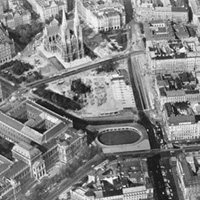Parking Policies and the Requalification of the Historical Town
Abstract
The paper focuses on the topic of the relationship, often conflict, between conservation/requalification of the historical city and parking policies. Such a relationship has always played a determining role in the definition of the requalification policies in the historical town, as noticed by the wide debate that, during the time, has been carried out by groups of various and conflicting stakeholders involved in the definition and implementation of parking policies in the historical city. Often with the generic term “parking” many heterogeneous types of parking are indicated, each of them requiring a different and appropriate approach, but in any case, the parking is the way in which private cars are used for the majority of the time. However, the incompatibility between private car traffic and historical centers is obvious. Not only for causes linked to the atmospheric pollution, traffic congestion and the consequent decrement of the life quality, but above all to the morphology of historical urban fabrics. These latter are grown having as reference not the car but the pedestrians and today they are, therefore, inadequate to support huge traffic flows. Basing on such considerations, the paper is aimed at deepening the different approaches that have characterized during the time the implementation of parking policies in the historical cities till the Nineties. Successively, a comprehensive review of the most recent parking policies in the historical cities is provided, trying to highlight their main strengths and weaknesses and deepening the integrate parking policies. These policies improve the development of synergies between the development of public transport network, the appropriate localization of the parking facilities, the disincentives to the private car transport and so on. In these experiences, parking management seems to be an effective and little expensive tool in order to orient the choice of the transports in urban areas. The positive impacts are high in the historical center, preventing the tourists and workers parking. In detail, the more recent experiences indicate as main criteria to follow for the parking policies in the historical town the avoiding of free, not restricted or with low pricing rates parking areas in sensible historical ambit since they increase the traffic flows. Parking areas, also for residents, near the street would be avoided if possible, since it creates difficulty to the traffic flows. Near attractive polarities it seems to be useful to realize parking for fast stops with progressive pricing rates to not encourage long time stops. Moreover, the participation of all the stakeholders is relevant for the implementation of parking management policies. Only satisfying such requirements the parking management can really stimulate the shift towards sustainable transport modalities, allowing a new use of the public urban historical space.Downloads

Copyright (c) 2014 Tema. Journal of Land Use, Mobility and Environment

This work is licensed under a Creative Commons Attribution 4.0 International License.
Authors who publish in this journal agree to the following:
1. Authors retain the rights to their work and give in to the journal the right of first publication of the work simultaneously licensed under a Creative Commons License - Attribution that allows others to share the work indicating the authorship and the initial publication in this journal.
2. Authors can adhere to other agreements of non-exclusive license for the distribution of the published version of the work (ex. To deposit it in an institutional repository or to publish it in a monography), provided to indicate that the document was first published in this journal.
3. Authors can distribute their work online (ex. In institutional repositories or in their website) prior to and during the submission process, as it can lead to productive exchanges and it can increase the quotations of the published work (See The Effect of Open Access)
